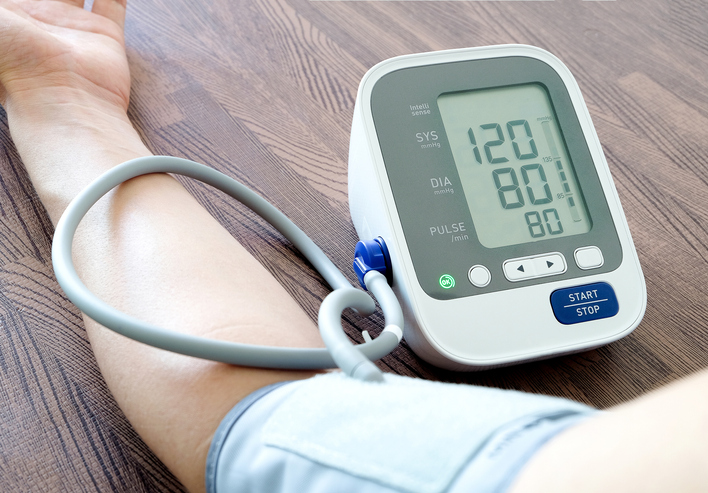
Regulating blood pressure is an important part of maintaining good health since high blood pressure is one of the biggest factors that lead to heart disease (Yang, et al., 2017). Also known as hypertension, high blood pressure is a significant contributing factor to early mortality, and one of the most frequent causes of death worldwide (Yang, et al., 2017). While medication can often be used as treatment for high blood pressure, making appropriate changes to one’s lifestyle can also contribute greatly to lowering it (“10 drug-free ways to control high blood pressure”, 2021).
Read on to find out more about the causes of high blood pressure, lifestyle changes that can reduce it, and how a wellness professional can help.
Which Factors Can Cause High Blood Pressure?
There are many significant contributors to high blood pressure, one of which is weight gain (“10 drug-free ways to control high blood pressure”, 2021). When a person’s weight starts expanding, their blood pressure also rises. This is why losing weight can be a productive solution for reducing blood pressure, particularly as sleep apnea can result from gaining too much weight, which leads to an even higher blood pressure rate (“10 drug-free ways to control high blood pressure”, 2021). High levels of chronic stress can also raise one’s blood pressure. In these situations, one must identify the factors that are causing them stress. From there, they should strategize how they can minimize their stressful emotions, even if that means developing healthier coping mechanisms rather than getting rid of the stressor entirely (“10 drug-free ways to control high blood pressure”, 2021).

It can be difficult to diagnose high blood pressure at first, as symptoms are not often felt by those with such high blood pressure levels during its onset (Yang, et al., 2017). High blood pressure can also lead to issues with one’s kidneys and blood vessels. A sign that hypertension is present can be determined by the ratio of systolic to diastolic blood pressure, particularly if the ratio is higher than 140/90 mmHg (“High Blood Pressure”, 2020). Additionally, high blood pressure is often associated with an increased risk of both stroke and heart disease. When someone more actively regulates their blood pressure, the risk of these diseases can be significantly reduced. The likelihood of suffering a stroke can be reduced by as much as 42% (Yang, et al., 2017).
Examples of Lifestyle Changes to Lower Blood Pressure
Anyone looking to more easily regulate their blood pressure should do so by making the necessary lifestyle changes, in order to avoid needing to be prescribed medication (“10 drug-free ways to control high blood pressure”, 2021). There are multiple examples of how this can be done that you can recommend to clients after completing wellness college. These include regular exercise, reducing alcohol and caffeine consumption, quitting smoking, and eating a healthy diet low in sodium, cholesterol, and saturated fats (“10 drug-free ways to control high blood pressure”, 2021). More innate factors can also contribute, such as one’s sex, race, age, and any pre-existing comorbidities (Yang, et al., 2017).

Research has also shown that making productive, healthy changes to one’s lifestyle reduces the need for medication to combat high blood pressure. A 2018 research study had 129 men and women between 40 to 80 years of age through a 16-week intervention where they made significant changes to their weight management and/or eating habits (“Lifestyle changes reduce the need for blood pressure medications”, 2018). After these were completed, research findings indicated that the volunteers—each of whom were overweight and had high levels of blood pressure—lost as much as 19 pounds on average and saw significant drops in diastolic and systolic blood pressure. This was especially true for those who made changes to both their eating habits and weight management, as only 15% still needed medication afterward (“Lifestyle changes reduce the need for blood pressure medications”, 2018).
How Can Wellness College Students Help?
While getting your wellness coach diploma at a school like Rhodes Wellness College, you can expect to spend a significant amount of time learning about four primary components of wellness: emotional, mental, spiritual, and physical. The latter category is especially relevant with regards to helping clients regulate their weight and blood pressure. Additionally, students in a wellness counselling program learn how to help them with their exercise and dieting habits, as well as challenging any particular belief systems they may have.
For anyone experiencing difficulty managing their blood pressure levels, there are several strategies a wellness counsellor can encourage for their clients. One example is reassuring clients that counselling is meant to be a space for them to confidentially share their issues with topics like these without judgment (“5 Ways Counselling Can Help You Lose Weight”, 2015). As a wellness counsellor, you can also provide emotional support to their clients, as well as develop a plan for how they can achieve their wellness goals. You can also use counselling as an opportunity to educate clients on appropriate eating habits and healthy lifestyle choices (“5 Ways Counselling Can Help You Lose Weight”, 2015). There is also empirical evidence to support counselling (specifically e-counselling) as a means of reducing hypertension. By using interactive online tools alongside counselling to help clients develop healthier habits, blood pressure levels were found to have decreased in the study’s participants (Nolan, et al., 2018).
Looking to get your wellness coaching certification?
Contact Rhodes Wellness College today!
Works cited:
5 Ways Counselling Can Help You Lose Weight. (2018, June 13). Retrieved from https://thethreeseas.com.au/5-ways-counselling-can-help-you-lose-weight/
10 drug-free ways to control high blood pressure. (2021, February 24). Retrieved March 11, 2021, from https://www.mayoclinic.org/diseases-conditions/high-blood-pressure/in-depth/high-blood-pressure/art-20046974
American Heart Association. (2018, September 9). Lifestyle changes reduce the need for blood pressure medications. ScienceDaily. Retrieved March 11, 2021 from www.sciencedaily.com/releases/2018/09/180909103056.htm
High Blood Pressure. (2020, July 17). Retrieved from https://www.healthlinkbc.ca/health-topics/hw62787
Nolan, R. P., Feldman, R., Dawes, M., Kaczorowski, J., Lynn, H., Barr, S. I., . . . Surikova, J. (2018). Randomized Controlled Trial of E-Counseling for Hypertension. Circulation: Cardiovascular Quality and Outcomes, 11(7). doi:10.1161/circoutcomes.117.004420
Yang, M. H., Kang, S. Y., Lee, J. A., Kim, Y. S., Sung, E. J., Lee, K. Y., Kim, J. S., Oh, H. J., Kang, H. C., & Lee, S. Y. (2017). The Effect of Lifestyle Changes on Blood Pressure Control among Hypertensive Patients. Korean journal of family medicine, 38(4), 173–180. https://doi.org/10.4082/kjfm.2017.38.4.173









